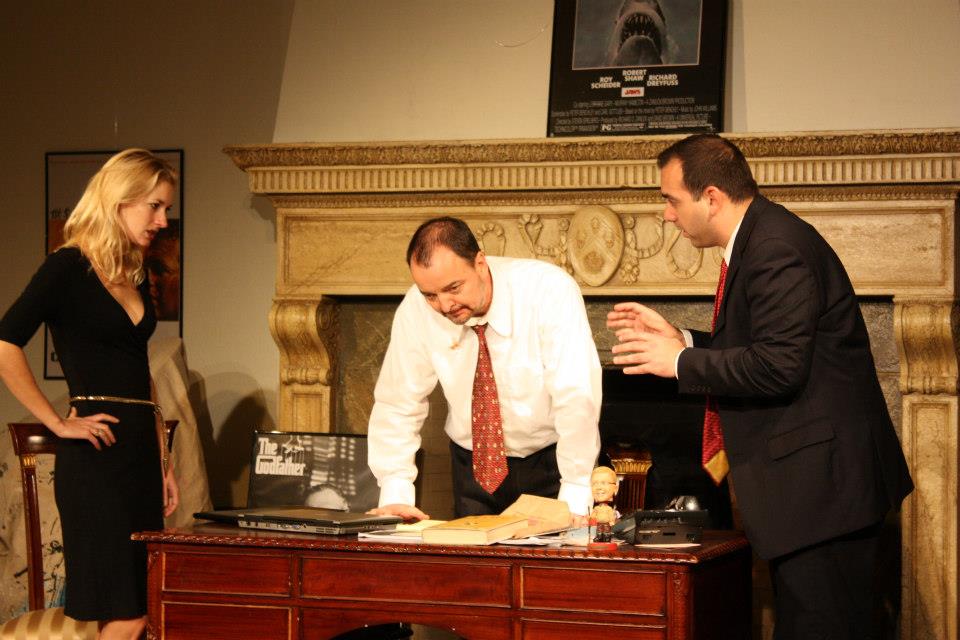Review of The Cult by New Haven Theater Company
Drew Gray’s The Cult, the latest offering by the New Haven Theater Company at their home in The English Building Markets, is a play about making connections and the effects such connections can have. Anyone might want a wider circle of friends or maybe different friends, but few of us form or join a cult for the sake of company. Perhaps the most lasting effect of the play is that it makes doing so seem not so bizarre or absurd as one might have thought.
When the play starts, many of the characters in The Cult have already found belonging in a group—the members don’t call it “a cult” themselves—formed by Tyler (Christian Shaboo), an earnest young man who seems to believe he hears the words of an entity called “Albean.” As with any religious ritual, the reasons for what the members believe and the purposes of the acts they perform can be a bit vague—or even silly—to outsiders. While at times Gray, who also directs and designed the show, wants to explore the comic possibilities of the cult situation, most of the attempts at humor seem like pandering to a dumbed-down sit-com. The story, as it develops in Act Two, is stronger than that.
The uneven mix of comedy and drama keeps the tone of the initial going a bit undecided. We don’t laugh at sad or pathetic people, and that’s what the cult members seem to be. Jared (Rick Beebe) is an introvert, Sally (Lauren Young) is an airhead, Alan (Erich Greene) is after sex, and so forth. The new business is that Tyler’s co-worker, Roger (a fidgety J. Kevin Smith), whose get-ahead wife (a fun cameo from Mallory Pellegrino) just dumped him, is curious about what Tyler’s into. Rather than laugh it off as too weird, Roger is intrigued, and wants to wear a robe and join “the cult.” The other development for potential drama is that Tyler manages to score a date with Rachel (Katelyn Marie Marshall), a shy co-worker who stays at home with her cats while he’s home changing the lives of his followers. Then there’s the issue of the farm.
A cult must have a goal, one supposes, and the goal here is not to await the Rapture or a Second Coming of Albean, but to live together in peace and harmony on the farm Tyler lived on as a boy. It was there he first heard the voice of Albean and, he believes, a return there will be like a return to Mecca. But first they must raise the money to buy what isn’t for sale. The various plot points get furthered when Tyler takes Rachel on a drive to the farm, and we meet Will (Trevor Williams), the man in possession of the place who, it turns out, is Tyler’s brother. Meanwhile, Jared has some distressing news.
Once Jared’s medical condition comes to light, the play, for the most part, drops its half-hearted attempts to be funny. The other thing that happens is that the longer we’re in their company, the more we begin to believe in these people who believe in Albean. And that shift in perspective is worth sticking around for.
In addition to our growing acceptance of the cult members, the play’s pay-off comes in how the other people in Tyler’s life—Will and Rachel—react to his followers. The stress that memberships can cause one’s relationship with non-members plays out in well-acted scenes. What’s more, the fact that neither Will nor Rachel can stomach the implications of Tyler as a “prophet of Albean,” preferring to see him as emotionally disturbed (Will) or some kind of snake-oil salesman (Rachel), ratchets up the tensions of belonging and believing in the face of naysayers.
The Cult is at its best in one-on-one moments where characters can be revealed, such as the awkward dating between Tyler and Rachel, Tyler’s patient appraisal of Jared’s anxious revelations, or—a scene that suggests interesting back-story—the sibling rivalry of Tyler and his fed-up brother. The cult members themselves are at their best when reacting to Tyler—played by Shaboo without an ounce of guile or irony—though a surer hand with comic pacing and timing could have us laughing at them before we start taking them seriously.
New Haven Theater Company
The Cult
Written, directed, and designed by Drew Gray
Produced by Peter Chenot; Original Music by Drew Gray; Stage Managed by Drew Gray; Audio Supervision by Ray Stephens; Props by Drew Gray, Margaret Mann, Trevor Williams
Cast: Rick Beebe (Jared); Erich Greene (Alan); Katelyn Marie Marshall (Rachel); Deena Nicol-Blifford (Jane); Mallory Pellegrino (Veronica/Samantha/Ellen); Sandra Rodriguez (Charlie); Christian Shaboo (Tyler), J. Kevin Smith (Roger); Tim Smith (Tommy); Trevor Williams (Will); Lauren Young (Sally)
New Haven Theater Company
The English Building Markets
839 Chapel Street, New Haven
May 28, 29, 30 and June 3, 4, 5, 6, 2015





